|
 |  |  |  |  | |

With foundries stretching across 10 U.S. states and Canada, over the past seven years, McWane Inc. has amassed more safety violations than all of its major competitors combined. More than 4,600 of its workers have been hurt on the job since 1995, and nine have been killed. Here are profiles of some of the employees who were injured or killed at McWane plants.
|
| 
|

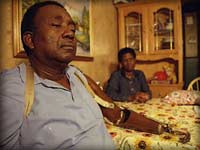
Ira Cofer was a mechanic at Tyler Pipe Company in Tyler, Texas. In
January 1997, as he was working around an unguarded moving conveyor, one
of his sleeves became entangled in the machinery. His arm was pulled
under the belt system and trapped there.
Because of layoffs, Cofer was working alone at the time. He watched
helplessly as his left arm slowly disintegrated. "The belt rubbed it all
down to the bone and took all my flesh off," he recalls.
The report of his accident is graphic: "Cofer was missing for more
than two and a half hours, yet he was crying out for help the entire
time. When he was finally heard, they found him standing on top of his
hard hat, trying to relieve the pressure on his arm."
Cofer remembers that he talked to God and that the pain eventually
ceased. But every day he struggles with his disability. "I know I got to
get used to it," he explains, "but some things you can't just never get
used to."
After Cofer's accident, four more amputations occurred at Tyler Pipe. |
 |
|

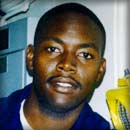
Reginald Elston was an electrician who had served in the Navy and had
a baby daughter. In need of work, he took a maintenance job at Union
Foundry in Anniston, Ala.
On Aug. 22, 2000, while he was working at a conveyor belt that was
running and unguarded, Elston was yanked head first into a machine,
where he died with his left hand just inches away from a safety shutdown
switch.
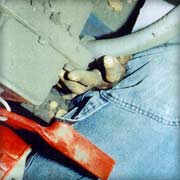
Clyde Dorn was in charge of safety at Union Foundry at the time of
Elston's death. He has since been fired after he was arrested and
convicted for trafficking in the painkiller OxyContin.
Dorn says that at the time of the accident there was new construction
occurring in that particular department, and he had been told that the
particular conveyor belt where Elston was killed was part of the new
construction. "I was not allowed to get involved in new construction,"
he says. But he admits he later found out that the tail pulley was not
part of the new construction and had been in regular operation.
The job at of Union Foundry was the first position as
safety director Dorn had held. He says that he had no budget or
assistants. Asked if he had the authority to stop production, he replied
that the decision was the plant manager's to make. When pressed, Dorn
admitted, "Well, if someone was caught in the machine, I could shut it
off."
According to an Aug. 30, 2005, report in The New York Times, McWane agreed to plead guilty to federal safety and environmental crimes at Union Foundry, including a willful federal safety violation for not having the required safety guard on the conveyor belt that killed Elston. |
 |
|

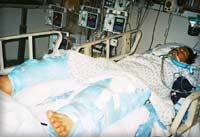
On Oct. 29, 2002 -- in the middle of an OSHA inspection -- Guadalupe
Garcia was crushed between a truck and a metal bin at Tyler Pipe. Garcia
was nearly cut in half by the incident and doctors fought for days to
save his crushed legs and pelvis. It took hundreds of units of blood to
keep Garcia alive, and one week after the accident both of his legs were
amputated. The accident is still being investigated. |
 |
|

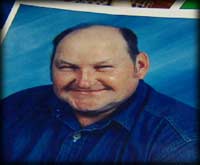
Jerry Hopson died a long slow death after a 1996 accident that
happened at the Tyler Pipe plant. As he was taking a familiar shortcut
across an unguarded machine, the machine started up and crushed him.
"The company should have had a shield up there, or some kind of
guard, where those guys could not walk across that cylinder," says
Hopson's brother Bobby, who also used to work at Tyler Pipe. Bobby says
that supervisors knew that workers were using a dangerous route --
because they too used the same shortcut.
At the time, the company denied responsibility for Jerry Hopson's
accident. A company official told the local paper that Hopson was "a
very capable, dedicated, good man who made a very big mistake." Hopson
died after more than 20 operations. |
 |
|


According to his daughter and twin brother, Rolan Hoskin was
desperate for work and had nowhere else to turn. He was divorced and
in debt when, in May 2000, he took a maintenance job on the graveyard
shift at Tyler Pipe.
"He was always saying how dangerous it was out there," his brother
Nolan recalls. "Really, the training wasn't adequate. Nobody showed
nobody how to do nothing. You know, they just -- you're on your
own."
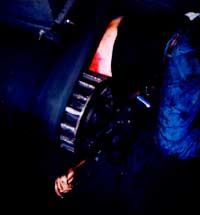
Working alone at four in the morning, with little experience, Hoskin
entered a sand pit to adjust a moving, unguarded conveyor belt -- a
dangerous and illegal, but routine, practice at the plant. The machine
grabbed his arm.
The graphic photos by investigators show that Hoskin never had a
chance. After the accident, the company argued that it was his own
fault.
"My dad isn't the kind of person -- he wasn't stupid," says Hoskin's
daughter April. "He wasn't stupid, but he didn't want to lose his job.
And he felt like if he didn't do whatever he needed to do, that he would
lose his job. And he was just trying to make it -- trying to get back on
his feet and make it."
Rolan Hoskin was the only employee whose death would result in
McWane's being held criminally responsible under federal law. The
company was charged with the maximum penalty -- a misdemeanor -- and
then paid a fine of $250,000. No one was sent to jail. |
 |
|

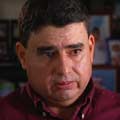
Marcos Lopez says that every morning his day begins with pain. Now 45
years old, he has worked at the Tyler Pipe foundry since high school. In
March 2002, he suffered a serious back injury while working on a pipe
molding machine. Like many of the other 4,600 McWane workers hurt on
the job since 1995, Lopez is struggling with his disability.
"I work all my life," he says. "I put all my time, my energy. I'm a
dedicated worker. Never been late and everything. And I feel destroyed.
Destroyed."
Michelle Sankowsky, a nurse hired by Tyler Pipe to bring soaring
workers' compensation costs under control, was there when Lopez was
injured. "He was obviously in an extreme amount of pain," she recalls.
"There was not any position or anything we could do to alleviate his --
you can't even call it discomfort. It was just flat out pain. He was in
actual shock."
However, instead of calling an ambulance and sending Lopez to a
hospital, skeptical company managers sent him in a van to a private
clinic under contract to Tyler Pipe, where he was diagnosed with back
strain and given an ice pack and some pain medication. Company records
show that as Lopez was sitting at home, plant managers were discussing
putting him under surveillance to see if he was faking his injury.

After ten days of agony, Lopez returned to the clinic and asked for
an X-ray, which revealed that his back was broken. According to
Sankowsky, even after the X-ray, Lopez was not hospitalized.
"They did not refer him to a surgeon," she says, "and, in fact, they did
not tell Mr. Lopez himself that he had a compression fracture of the
spine. I said, 'Why do you not tell this gentleman that he's got a
compression fracture of the spine?' And they said to me, 'Well, then
he'd know how hurt he was.'"
It was a full 25 days after his accident before Lopez finally had
surgery that attempted to repair his damaged back with screws and a
plate. The owner of the clinic where Lopez was initially treated says
that Lopez "got the care that he needed." McWane suggests that Lopez is
a malingerer. A medical examination by the state of Texas says that he
is healing, but will be partially disabled for life. |
 |
|

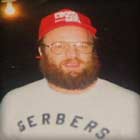
On Jan. 13, 1995 at McWane-owned Kennedy Valve in Elmira, N.Y., an explosion killed Frank Wagner, a 20-year
veteran at the plant.
Wagner had been ordered to dispose of hundreds of gallons of a
volatile and highly toxic paint by burning it in an oven. Environmental crime investigators would discover that the oven had been modified and
was never designed to serve as an incinerator.
The explosion at Kennedy Valve was the one case for which McWane
nearly got indicted for criminally negligent homicide. Although a team
of veteran New York State prosecutors and investigators came to the
conclusion Frank Wagner's death was the result of criminal negligence by
McWane, in a confidential memo to then New York State
Attorney General Dennis Vacco's office, McWane's attorneys made it clear
that they would not accept any criminal responsibility for the death. They also suggested that the attorney general would damage his
political future by presenting an "anti-business" message.
Vacco now says he was not impressed by the company's threat, but at
the time he called it "blackmail." He vehemently denies that political
pressure derailed the prosecution.
More than two years after Wagner's death, faced with the possibility
of federal intervention, McWane agreed to pay $500,000 in donations and
fines and pled guilty to an environmental felony. The plant manager
pled guilty to a misdemeanor and paid an $85 fine.
|
 |  | | | |  | |
 |
 home / transcript / mcwane story / toothless in washington / workers' comp fraud
cost of workplace injuries / discussion / ny times features / readings & links
press reaction / tapes & transcripts / credits / privacy policy / nytimes.com chat / reporter's chat
FRONTLINE / wgbh / pbsi
photograph copyright ©2003 geostock/getty images - all rights reserved
web site copyright WGBH educational foundation
|  |
|